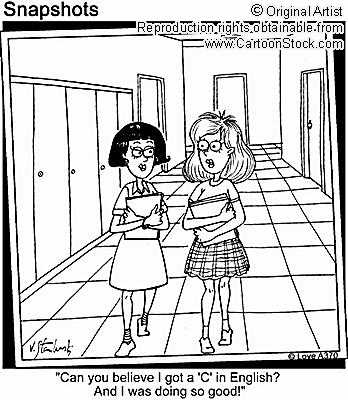There has been a raging war between who vs. whom for quite some time now.
Ultimately, "who" is a subjective pronoun, which means that it acts as the subject in a sentence.
Ex. Who won the race yesterday? He won the race [that is who].
"Whom," the archenemy of every high school English student, is an objective pronoun, which means that it acts as the object in a sentence.
Ex. There are many students with whom Jen has connections.
Rephrased: Jenny has connections with them [the many students].*
*In most grammatical situations, a preposition is paired with whom ("for whom," "with whom," "by whom," "to whom" etc.), but there are exceptions to those situations as well.
What examples of the use of "who vs. whom" have you come in contact with?
Post an example for the class to discuss.
Know Malapropisms Aloud

Why did Missy probably deserve that "C" in English?
Sunday, February 3, 2008
"Know Malapropisms Aloud"
A "malapropism" is the use of an incorrect word in the place of the correct one that lends comic relief.
For instance, the title of this blog is "Know Malapropisms Aloud," which has you, as the reader, believing that malapropisms should be identifiable through sound; however, Miss Kaser has created a homophonous malapropism of the title "No Malapropisms Allowed."
Fun Fact: The term "malapropism" is derived from a seventeenth-century character in Sheridan's The Rivals, "Mrs. Malaprop," who continually mixes up what she intends to say. A very famous example is: "He is the very pineapple of politeness" [i.e. pinnacle].
This weblog will frequently review certain terms in English grammar, literature, and vocabulary, such as this one.
For instance, the title of this blog is "Know Malapropisms Aloud," which has you, as the reader, believing that malapropisms should be identifiable through sound; however, Miss Kaser has created a homophonous malapropism of the title "No Malapropisms Allowed."
Fun Fact: The term "malapropism" is derived from a seventeenth-century character in Sheridan's The Rivals, "Mrs. Malaprop," who continually mixes up what she intends to say. A very famous example is: "He is the very pineapple of politeness" [i.e. pinnacle].
This weblog will frequently review certain terms in English grammar, literature, and vocabulary, such as this one.
Subscribe to:
Comments (Atom)
